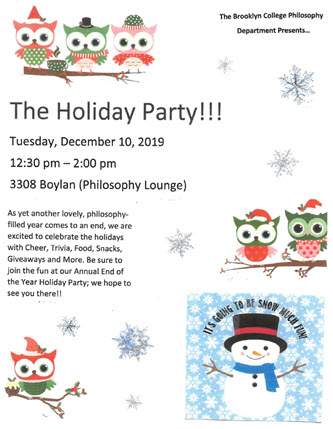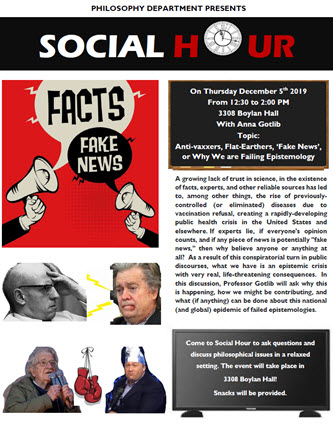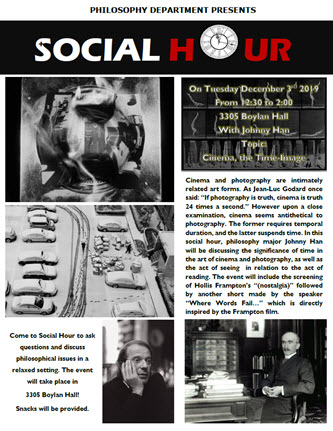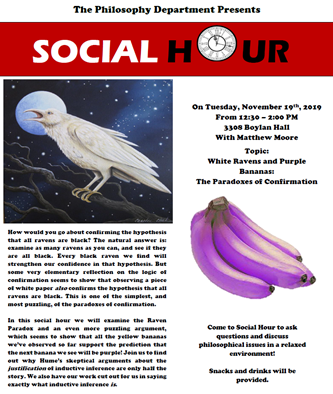Fall 2019 Events

Event Flier: Holiday Party (December 10)
Tuesday, December 10
Holiday Party
12:30–2 p.m.
3308 Boylan Hall
As yet another lovely, philosophy-filled year comes to an end, we are excited to celebrate the holidays with cheer, trivia, food, snacks, giveaways and more. Be sure to join the fun at our annual end of year holiday party. We hope to see you there!

Event Flier: Anti-vaxxers, Flat-Earthers, ‘Fake News’, or Why We are Failing Epistemology (December 5)
Thursday, December 5
Philosophy Social Hour Event Series
Anti-vaxxers, Flat-Earthers, ‘Fake News’, or Why We are Failing Epistemology
Speaker: Anna Gotlib
12:30–2 p.m.
3308 Boylan Hall
This is our sixth Philosophy Social Hour discussion for the fall 2019 semester.
The following is the abstract provided by Professor Anna Gotlib in regards to what she will be discussing:
A growing lack of trust in science, in the existence of facts, experts, and other reliable sources has led to, among other things, the rise of previously-controlled (or eliminated) diseases due to vaccination refusal, creating a rapidly-developing public health crisis in the United States and elsewhere. If experts lie, if everyone's opinion counts, and if any piece of news is potentially "fake news," then why believe anyone or anything at all? As a result of this conspiratorial turn in public discourses, what we have is an epistemic crisis with very real, life-threatening consequences. In this discussion, Professor Gotlib will ask why this is happening, how we might be contributing, and what (if anything) can be done about this national (and global) epidemic of failed epistemologies.

Event Flier: Cinema, the Time-Image (December 3)
Tuesday, December 3
Philosophy Social Hour Event Series
Cinema, The Time-Image
Speaker: Johnny Han
12:30–2 p.m.
3305 Boylan Hall
This is our fifth Philosophy Social Hour discussion for the fall 2019 semester.
The following is the abstract provided by Philosophy Major Johnny Han in regards to what he will be discussing:
Cinema and photography are intimately related art forms. As Jean-Luc Godard once said: “If photography is truth, cinema is truth 24 times a second.” However upon a close examination, cinema seems antithetical to photography. The former requires temporal duration, and the latter suspends time. In this social hour, philosophy major Johnny Han will be discussing the significance of time in the art of cinema and photography, as well as the act of seeing in relation to the act of reading. The event will include the screening of Hollis Frampton’s “(nostalgia)” followed by another short made by the speaker “Where Words Fail…” which is directly inspired by the Frampton film.

Event Flier: White Ravens and Purple Bananas: The Paradoxes of Confirmation (November 19)
Tuesday, November 19
Philosophy Social Hour Event Series
White Ravens and Purple Bananas: The Paradoxes of Confirmation
Speaker: Matthew Moore
12:30–2 p.m.
3308 Boylan Hall
This is our fourth Philosophy Social Hour discussion for the fall 2019 semester.
The following is the abstract provided by Professor Moore in regards to what he will be discussing:
How would you go about confirming the hypothesis that all ravens are black? The natural answer is: Examine as many ravens as you can, and see if they are all black. Every black raven we find will strengthen our confidence in that hypothesis. But some very elementary reflection on the logic of confirmation seems to show that observing a piece of white paper also confirms the hypothesis that all ravens are black. This is one of the simplest, and most puzzling, of the paradoxes of confirmation.
In this social hour we will examine the Raven Paradox and an even more puzzling argument, which seems to show that all the yellow bananas we've observed so far support the prediction that the next banana we see will be purple! Join us to find out why Hume's skeptical arguments about the justification of inductive inference are only half the story. We also have our work cut out for us in saying exactly what inductive inference is.
Event Flier: Experimental Philosophy and the Fruitfulness of Normative Concepts (November 7)
Thursday, November 7
Philosophy Social Hour Event Series
Experimental Philosophy and the Fruitfulness of Normative Concepts
Speaker: Matthew Lindauer
12:30–2 p.m.
3308 Boylan Hall
This is our third Philosophy Social Hour discussion for the fall 2019 semester.
Professor Matthew Lindauer will be discussing "Experimental Philosophy and the Fruitfulness of Normative Concepts." He will argue that moral and political philosophers are committed to the "fruitfulness" of normative concepts––roughly how well they help us to solve certain practical problems––mattering for the evaluation of these concepts. Lindauer will then examine what this means for the role of experimental philosophy in moral and political philosophy, and why philosophers, in particular, should be involved in conducting some of this empirical research. Snacks and drinks will be provided.
Event Flier: Eastern Philosophies (November 5)
Tuesday, November 5
Philosophy Social Hour Event Series
Eastern Philosophies
Speaker: Saam Trivedi
12:30–2 p.m.
3305 Boylan Hall
This is our second Philosophy Social Hour discussion for the fall 2019 semester.
We do a lot of Western philosophy around here; but beyond that, might there also be something worthy in philosophies outside the West? In this social hour, Professor Saam Trivedi will talk about various Eastern philosophies that originated in classical China and India a few centuries before Christ. Focusing largely on Confucian, Daoist, Hindu, and Buddhist philosophies, besides others, Trivedi will say something about what these views tell us about things that also arise in Western philosophy: ethics, society, reality, knowledge, the self, and enlightenment.
Come to Social Hour to ask questions and discuss philosophical issues in a relaxed setting. Snacks and drinks will be provided.
.png)
Event Flier: Phenomenology in Music: An Epistemological Investigation (October 15)
Tuesday, October 15
Philosophy Social Hour Event Series
Phenomenology in Music: An Epistemological Investigation
Speaker: Christina Weinbaum
12:30–2 p.m.
3305 Boylan Hall
This is our first Philosophy Social Hour discussion for the fall 2019 semester.
Can we ever "know" music? How can we "know" music? In this Social Hour presentation, Professor Weinbaum will argue that the most promising way by which to "know" and understand an artist's music is to experience and participate in live musical performance. She will discuss anecdotes from both musicians and avid show goers. Come to Social Hour to ask questions and discuss philosophical issues in a relaxed environment. Snacks and drinks will be provided!
.png)
Event Flier: Plato on the Unity of Comedy and Tragedy (October 3)
Thursday, October 3
Plato on the Unity of Comedy and Tragedy
Speaker: Franco Trivigno (University of Oslo)
12:30–2 p.m.
3308 Boylan Hall
Professor Trivigno's paper takes its starting point from the end of the Symposium, in which Socrates argues that it is the "same man who knows how to compose comedy and tragedy and that the one who possesses the art of tragic poetry is also a comic poet" (223d). Socrates is trying to convince the tragedian Agathon and the comic playwright Aristophanes, both of whom are drunk and in the process of passing out. We are never told what the arguments are, and both dramatists doze off before the conversation is finished. This highly suggestive passage will form the starting point for my discussion of the unity of comedy and tragedy.
I will attempt a speculative reconstruction of Socrates' arguments in order to formulate precisely the senses in which comedy and tragedy constitute a unity. I will deny that comedy and tragedy are the same; rather, I will argue that there are at least three ways in which comedy and tragedy may be said to form a unity: in that they share the same aim, in that they endorse a single theory of value, and in that the objects that they imitate—ridiculousness and seriousness in agents and actions—form opposite parts of the same branch of knowledge.






